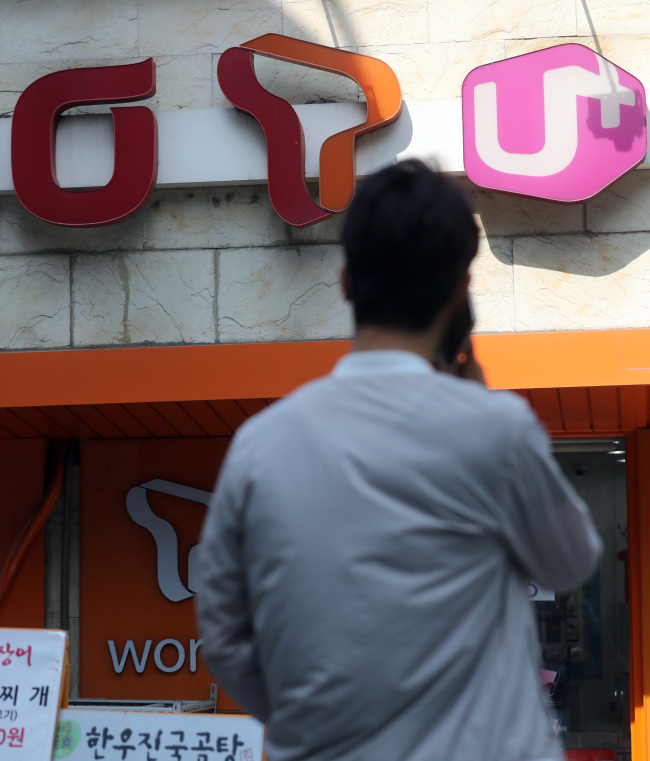South Korea’s mobile carriers on Thursday expressed concerns over an expected fall in revenue due to the Moon Jae-in government’s plan to reduce the burden of mobile costs on low-income households and the elderly.
“Telecom companies are already suffering revenue falls,” said an official at one of the three mobile carriers here, who declined to be named. “The government’s plan poses a serious threat to not just a single company, but the whole industry.” The official said the government’s plan was not discussed with the telecom firms.
The State Affairs Planning Advisory Committee announced Thursday morning a package of measures to cut a total of 4.63 trillion won ($4.06 billion) worth of mobile costs.
The committee said it will revise the Telecommunications Business Act with the National Assembly in July in order to force the telecom firms to implement the measures starting September.
President Moon had pledged to scrap 11,000 won base rates for nearly all mobile phone users, but the announced measures appeared to have been scaled back due to strong backlash from the industry.
The debate over high telecommunications fees has remained persistent in South Korea, with Moon’s predecessors including former Presidents Lee Myung-bak and Park Geun-hye all having introduced their versions of measures to cut costs. The measures, however, usually became half-baked due to conflicting interests of the involved parties.
Thursday’s decision by the government committee also drew flak from both consumers and the telecommunication industry, with consumer groups criticizing it as being scaled down from the original plan and companies protesting it as an “anti-market” move that would hinder their operations, such as investments in the upcoming fifth generation network.
Under the latest measures, the telecom industry would have to shave off its 11,000 won base rate per month for senior citizens aged 65 or above. The committee estimated about 1.93 million senior citizens would benefit from the plan.
Users from low-income households on state medical subsidies will also be eligible for the 11,000 won cut. In total, 5.84 million people, or 11.3 percent of the entire population would be eligible for the cut, the committee said.
For ordinary users, the committee expanded a current optional 20 percent discount for monthly bills to 25 percent. Users can choose whether to take a government subsidy worth 330,000 won for a new handset device or a 20 percent cut for their monthly mobile bills.
“These days, many users opt for the monthly discounts rather than taking the lump-sum subsidy,” an industry source said. “Larger discounts would also affect the sales of the telecom companies.”
Up to 19 million people are expected to be able to get the expanded discounts, which adds up to 1 trillion won, the committee said.
The committee also suggested the introduction of a universal mobile plan set at 20,000 won per month, which is 11,000 won cheaper than current plans that provide 200 minutes of voice calls and 1 gigabyte of data for about 25.7 million users. When introduced, this measure is estimated to help reduce a combined 2.2 trillion won in mobile costs.
“The Ministry of Science, ICT and Future Planning has studied details of mobile plans by each telecom firm,” said Lee Kai-ho, head of the committee. “The increase in the discount percentage is deemed endurable by the companies.”
Lee also said the measures are not a retreat from the initial campaign pledge, saying the introduction of the universal plan would have the same effect as lifting the mobile tariffs for fourth-generation Long Term Evolution bills, while the cuts for elderly are equivalent to scrapping the base rates for 2G and 3G network plan users.
As for an outright abolishment of base rates for all mobile plans, the committee said it will continue pushing for it based on social consensus in the long run.
However, mobile service providers are not on the same page as the committee.
Due to downward trends in profitability, the country’s three mobile carriers -- SK Telecom, KT and LG Uplus -- have been adopting a negative view toward President Moon’s campaign pledge to abolish mobile tariffs.
“Since each mobile carrier offers consumers a variety of mobile plans tailored to age groups, soldiers and the low-income group, it is very difficult for the companies to come up with more,” said an official at another mobile firm.
The Korea Telecommunications Operators Association issued a statement, saying “It is a pity to see the committee announce the measures without discussion with the industry.”
“The association will seek measures to help both reduce the mobile burden and promote the industry’s development by holding discussions with the government on each issue,” it said.
The committee also mentioned the establishment of public Wi-Fi networks on 50,000 buses and at 150,000 schools, which is estimated to reduce up to 850 billion won in mobile bills for salarymen and students.
The heated debate has, meanwhile, rekindled calls for an overhaul of the distribution structure of mobile telecommunication devices -- in which different parties are involved when the final cost is appropriated for customers -- including the cost for telecommunication service, the handset, subsidies and sales incentives.
Over 90 percent of the mobile handsets are supplied to consumers through telecommunication companies here.
By Song Su-hyun (
song@heraldcorp.com)






![[Exclusive] Hyundai Mobis eyes closer ties with BYD](http://res.heraldm.com/phpwas/restmb_idxmake.php?idx=644&simg=/content/image/2024/11/25/20241125050044_0.jpg)
![[Herald Review] 'Gangnam B-Side' combines social realism with masterful suspense, performance](http://res.heraldm.com/phpwas/restmb_idxmake.php?idx=644&simg=/content/image/2024/11/25/20241125050072_0.jpg)
